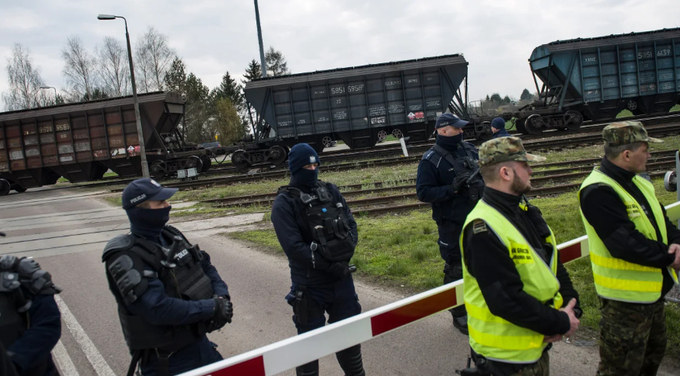November 25, 2025 | 20:42 GMT +7
November 25, 2025 | 20:42 GMT +7
Hotline: 0913.378.918
November 25, 2025 | 20:42 GMT +7
Hotline: 0913.378.918

Policemen and border guards protect a train carrying Ukrainian grain at the broad-gauge railway line crossing in Hrubieszow, Poland, on April 12, 2023. Photo: Attila Husejnow/SOPA Images/LightRocket/Getty Images
The Polish prime minister’s office said the move was “to protect the Polish agricultural market against destabilization.”
Ukraine responded by saying it “regrets the decision of its Polish counterparts” and was ready to cooperate with Poland in an investigation of any possible abuses.
Hungarian Agriculture Minister István Nagy on Sunday announced Budapest would also temporarily ban the import of grain, oil seeds and other agricultural products from Ukraine, saying the move was necessary “in the absence of meaningful EU measures.”
The European Commission condemned the move, saying it was not for individual members to decide trade policy.
“It is important to underline that trade policy is of EU exclusive competence and, therefore, unilateral actions are not acceptable,” the commission’s Arianna Podestà told CNN.
When Russia invaded Ukraine it blocked ports and sea routes used to export Ukrainian grain to Africa and the Middle East.
Fearing widespread famine, the European Union lifted duties on grain from Ukraine to ease distribution to those global markets.
Ukrainian grain has since flowed into Poland but much of it has remained in the country, bringing down the price and causing Polish farmers to suffer significant financial losses.
Farmers across central and eastern Europe have been demonstrating against Ukrainian grain imports.
Protesters blocked traffic and border checkpoints with tractors along the border between Romania and Bulgaria, in an effort to prevent Ukrainian trucks from entering their country.
Local producers say they cannot compete with the price of Ukrainian grain and have demanded compensation from the European Commission.
Anger grew after the European Commission announced a draft decision to extend duty-free and quota-free imports of Ukrainian grain until June 2024, prompting the resignation of the Polish agriculture minister.
There has been similar opposition in Bulgaria, where producers have complained of warehouses full of products they cannot sell.
“Bulgaria is in solidarity with Ukraine, but a local glut is being created on the agricultural market, because instead of export corridors our countries are becoming warehouses,” Bulgaria’s agriculture minister Yavor Gechev said.
(CNN)

(VAN) Brazil's COP30 presidency pushed through a compromise climate deal on Saturday that would boost finance for poor nations coping with global warming but that omitted any mention of the fossil fuels driving it.

(VAN) Poultry farmers in the UK have been warned that they could face one of the worst winters yet for bird flu.

(VAN) Prices of main-crop paddy have risen sharply, with jasmine rice hitting 16,100 baht per tonne — the highest level in years.

(VAN) In Brazil, FAO unveiled a series of reports and initiatives showing how sustainable agrifood systems are a solution to the climate crisis.

(VAN) With names like neodymium and dysprosium, rare-earth elements sound exotic — and their perceived scarcity has only added to the mystique.

(VAN) In a new study published in Trends in Biotechnology, researchers used a gene-editing technology called CRISPR to increase a fungus's production efficiency and cut its production-related environmental impact by as much as 61%- all without adding any foreign DNA.

(VAN) A top official in Beijing’s Cop delegation says China is committed to clean energy – but US’s absence is a problem.